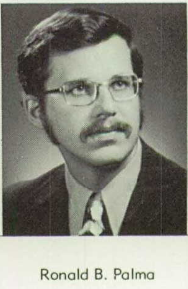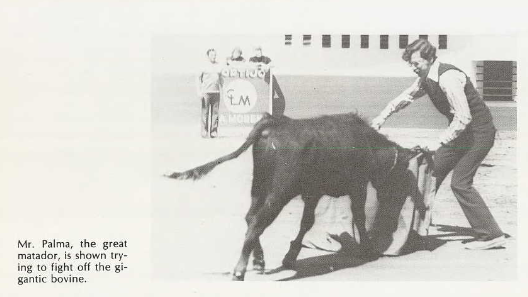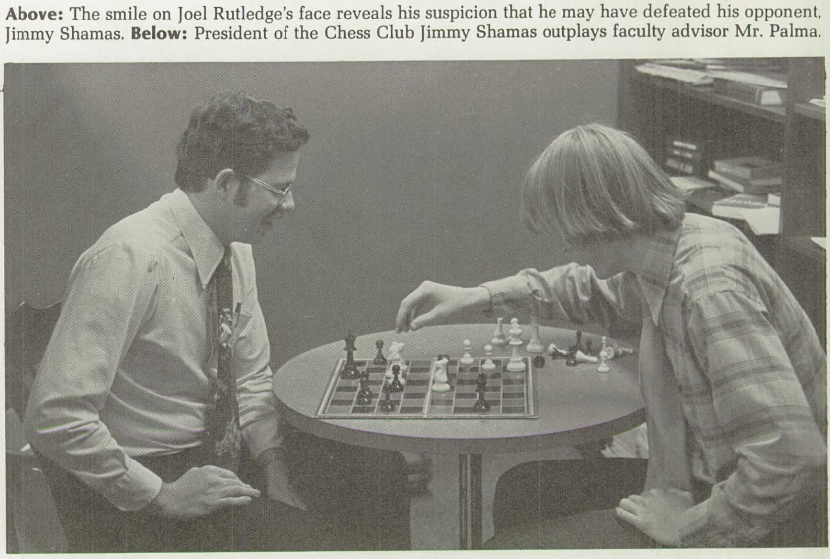Ave atque vale, Magister: Ronald Palma, RIP

Last week I received the sad news that Ron Palma, my high school Latin teacher, passed away on Monday, September 19, 2022, at the age of 75. He is survived by Fay, his college sweetheart and wife of 55 years, two daughters, and three grandchildren. His 38-year career at Holland Hall School placed him among the half-dozen longest serving teachers in the school's 100-year history.
Mr. Palma was not my first Latin teacher. I took Latin I in 8th grade, taught by Bill Bippus, who is an Episcopal priest these days, and Ruth Kaiser Nelson filled in for Mr. Bippus during his leave of absence the first semester. Mr. Bippus and Mrs. Nelson were memorable, enjoyable, and excellent teachers and gave me a great foundation in the Latin language. The three years I spent as Mr. Palma's student built in me a love for the language that remains to this day and which I've tried (and succeeded to varying degrees) to pass along to my children. The value I found in Latin learning was part of what led me to find a way to study Latin while a student at MIT, to embrace classical education for my own children and to seek, as a board member of the nascent Tulsa Classical Academy (opening 2023), to make this kind of education available to the wider Tulsa community.

My classmates and I first encountered Ron Palma in Latin II, in 1977, just four years into his 38-year career at Holland Hall School. He was in a doctoral program at the University of Cincinnati, a "Ph.D.A.B.D." (all but dissertation), when he was hired by Holland Hall in 1973. Above, that's his yearbook photo from his very first year of teaching.
Mr. Palma had a hearty and infectious laugh and a great deal of tolerance for the hijinks of high school boys. We called him Magister, merely the Latin word for teacher, but it became a term of endearment long after our time at school. His office during my freshman year was just off of the Barnard Commons (the eastern cluster of offices, first door on the right) and was a favorite hangout. When Mr. Palma's office moved to the mezzanine overlooking the commons, it became a target for excessive decoration, particularly around Christmas time. He was good-natured about the ribbing we gave him for supporting independent candidate John Anderson (10% in the 1980 presidential election).
And we learned Latin and learned to love it. In Latin II we completed our study of grammar; in Latin III we delved into prose and poetry; and in Latin IV we read the first six books of the Aeneid in Latin, following pius Aeneas from the burning ruins of Troy to the palace of Queen Dido of Carthage to the shores of Latium and the future site of Rome. Mr. Palma taught us dactylic hexameter, hendecasyllablic verse, and the rules of vowel quantity and elision, and he had us memorize the first seven lines of the Aeneid (of which I can remember the first two): "Arma virumque cano, Troiae qui primus ab oris Italiam, fato profugus, Laviniaque venit...." One assignment involved writing epigrams, after the fashion of Martial; one of mine began, "O Boren bos bifrons...."
The fact that many students continued Latin into years 3 and 4 is a tribute to Mr. Palma's love of the language, his skill as a teacher, and his connection with students.
In addition to classroom duties, during his early Holland Hall career Mr. Palma also served as coach of the cross-country running team, Chess Club sponsor, and faculty advisor to Hallway, the school newspaper.

Shortly after my time at Holland Hall, Ron Palma was co-author of a very popular series of Latin textbooks, Ecce Romani, which teaches the language through a narrative about a Roman family. The series introduces an increasing number of authentic Roman texts as the student progresses. This review has a description of the Ecce Romani approach to Latin instruction.
In 1991, the College Board honored Mr. Palma for instructional excellence as an Advanced Placement Latin teacher, beginning in 1976. At the time of this Special Recognition Award, he estimated that 150 Holland Hall students had taken the AP Latin exam. (I was foolishly not among them, having opted to take a geology class as a senior that I didn't need for graduation instead of AP Latin.)
Mr. Palma loved travel, particularly to lands once part of the Roman empire, and enjoyed photographing the places he visited. I recall a stunning photo of red-tiled roofs against the caerulean Mediterranean sky which won a Tulsa Tribune photography contest.
After retirement in 2011, Palma spent the next three years writing a comprehensive history of Holland Hall School, in two volumes; Holland Hall: Since 1922 was published in 2016 by Grandin Hood, Nashville. It's a sad coincidence that he died just two days short of the centennial of the school he served, celebrated, and loved. I last saw him in April at the memorial service for his HH colleague, Carlos Tuttle.
A memorial service will be held at a later date. It was Mr. Palma's wish that gifts in his memory be made to the Holland Hall scholarship fund.
Third-year Latin is traditionally Caesar and Cicero. We read some of Caesar's Gallic Wars as well as The Millionaire's Dinner Party (Maurice Balme's adaptation for Latin students of the Cena Trimalchionis by Petronius). But in place of Cicero, Mr. Palma substituted the poetry of Catullus. Catullus was a contemporary of Caesar, a well-to-do young man from the provinces who had come to Rome, who lived fast and died young, around the age of 30. Some of Catullus's famous topics include his envy of the attention paid by his girlfriend to her pet sparrow (2) and his lament on the sparrow's death (3), a dinner invitation in which he asks his guest to bring food and drink, because his cupboard is bare (13), an appeal to his lover for thousands of kisses (5: "Vivamus, mea Lesbia, atque amemus... da mi basia mille"), a tribute to the boat which carried him home from Bithynia (4), and his joy at returning to his home in Sirmio after a long absence (31). Carmen 85 ("Odi et amo," "I hate and I love") captures in two lines the conflicted emotions of the disappointed suitor. There was a youthful vigor and clarity to Catullus's poetry that appeals to teen-aged Latin scholars in a way that the lengthy and allusive periodic sentences of a Ciceronian speech do not. (Be advised that some of Catullus's poetry, which, I hasten to add, we did not study in Mr. Palma's class, was a bit too vigorous and clear.)
Perhaps the most quoted and beloved Catullus poem is Carmen 101, his lament on arriving after a long journey at the grave of his brother, who died far from home. It seems a fitting way to end this tribute.
Multas per gentes et multa per aequora vectus
advenio has miseras, frater, ad inferias,
ut te postremo donarem munere mortis
et mutam nequiquam adloquerer cinerem,
quandoquidem fortuna mihi tete abstulit ipsum,
heu miser indigne frater adempte mihi.
nunc tamen interea haec, prisco quae more parentum
tradita sunt tristi munere ad inferias,
accipe fraterno multum manantia fletu
atque in perpetuum, frater, ave atque vale.Through many nations and through many seas borne,
I come, brother, for these sad funeral rites,
that I may give the last gifts to the dead,
and may vainly speak to your silent ashes, since fortune
has taken yourself away from me.
Ah, poor brother, undeservedly snatched from me.
But now receive these gifts, which have been handed down
in the ancient manner of ancestors, the sad gifts to the grave,
drenched with a brother's tears,
and for ever, brother, hail and farewell.
P.S. I would be happy to augment this entry with tributes from students and other friends of Ron Palma. Please email me at blog at batesline dot com.
P.P.S. P.S. stands for post scriptum, which is your actual Latin for "written after." The translation of Catullus 101 is from the 1894 translation by Leonard C. Smithers.
MORE: I reached out to Gilbert Lawall, professor emeritus of Classics at the University of Massachusetts at Amherst, to ask about Mr. Palma's involvement with Ecce Romani. Prof. Lawall replied:
In addition to being an inspiring and influential teacher of Latin language and literature, Mr. Palma helped Professor Gilbert Lawall of the University of Massachusetts at Amherst revise the Scottish Classics Group's Ecce Romani into an American version. Along with other consultants, Mr. Palma helped Professor Lawall change much of the vocabulary, many pictures, and some of the essays in the Scottish version. Mr. Palma co-authored the 212 page Teacher's Guide for Ecce Romani III with David J. Perry of the Rye Country Day School, Rye, New York.Mr. Palma frequently contributed articles to the Longman Latin Newsletter and to the Ecce Romani Newsletter, which contained lesson plans, teaching tips, exercises, work sheets, and sample quizzes and exams.
Triste dictu, Prof. Lawall advises that he no longer has copies of the print archive of newsletters that he mentions.
0 TrackBacks
Listed below are links to blogs that reference this entry: Ave atque vale, Magister: Ronald Palma, RIP.
TrackBack URL for this entry: https://www.batesline.com/cgi-bin/mt/mt-tb.cgi/8977